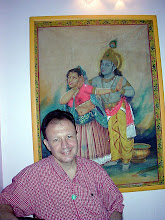
His first short stories were autobiographical to some extent; two were published in anthologies of gay Latinos: “The Two Miracles of The Gringos’ Virgin” in Bésame Mucho ( NY: Painted Leaf Press, 1999), and “My Lessons with Felipe” in Virgins, Guerrillas, and Locas (San Francisco: Cleis Press, 1999). In 1999, he enrolled in the graduate program on creative writing at Columbia University, where he started working on his first novel, Tales from the Town of Widows & Chronicles from the Land of Men (New York: Harper Collins, 2007), which has been translated into seven languages and published in more than twenty countries. It was originally inspired on an article he had read in a Colombian newspaper about a mountain village where Communist guerrillas had taken most of the men away. “What happens to the women who are left behind?” he thought. “They would be virtual widows, made to fend for themselves for the first time in their lives.” Although he knew they could survive without men, what he wondered was how they would go about it, and how this process would transform them as individuals and as a society. His novel is his answer to that question. “Writing my first novel in my second language was not a choice,” he said. “I conceived the idea originally in Spanish., wrote a few pages, but it didn’t feel right. Then I wrote a chapter in English and, though it was clumsily worded, I felt good about it. I realized that English offered me an original, unbiased perspective on the Colombian conflict.”
Tales . . . is currently nominated to the 2008 Lamda Literary Award, as well as to the 2008 Edmund White Debut Fiction Award.
He lives in New York City where he is working on his second novel. “All I can tell you is that it will be about religion, tolerance, and displacement,” he says. “It will have a strong heroine who makes a perilous and life-changing journey. It will be poignant, funny, subversive, and unlike anything you’ve ever read before.”
―Miguel Falquez-Certain
Encyclopedia of Contemporary LGBTQ Literature of the United States, vol. 1, edited by Emmanuel S. Nelson (Santa Barbara, California: Greenwood Press, 2009).
FURTHER READING
Kirsch, Jonathan, “The Feminine Mystique,” The Washington Post, February 18, 2007
“Books Briefly Noted,” The New Yorker, March 19, 2007.
For further information, visit www.jamescanon.com


0 Comments:
Post a Comment
<< Home